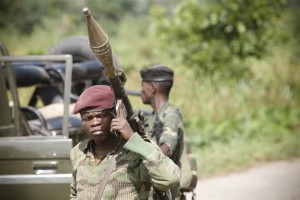The Enough Project has released a groundbreaking new report that documents the conflict gold smuggling network of the Eastern Congo-based M23 rebels.
The report, “Striking Gold: How M23 and its Allies are Infiltrating Congo’s Gold Trade,” reveals how M23 is involved in the lucrative gold trade in eastern Congo, which is worth approximately $500 million per year overall. Instead of controlling mines directly, M23 has built alliances with other armed groups in gold-rich areas and expanded its contacts with influential traders in Uganda, Burundi, and Congo to trade gold.
The report calls on U.S. Special Envoy Russ Feingold, the U.N. Security Council, U.N. Envoy Mary Robinson, and jewelry retailers to take concrete measures to limit the documented paths of conflict gold to international markets.
“Striking Gold identifies four main gold exporters whose business operations enable M23 and other armed groups to profit from the gold trade, according to UN experts reports and Enough Project research.
The report also names militia leaders, including M23 commander Sultani Makenga, who play a key role in the illicit trade. Makenga has built on the networks of former M23 co-commander Bosco Ntaganda and has extended alliances that cut across otherwise hostile ethnic and political divisions.
Ruben de Koning, co-author of the report, says, “Some of the major official gold exporters in Uganda and Burundi indirectly purchase smuggled gold from M23 and allied armed groups in violation of the U.N. arms embargo, and without exercising any due diligence on the origin of their gold. Sanctions against these individual exporters, as opposed to companies, would help prevent sanctioned owners from merely reinventing themselves under a new company name in order to continue operations.
U.S. and U.N. sanctions would make it harder for M23 and other armed groups to finance their struggle, and compel others to start mitigating such risk.”
Sasha Lezhnev, Senior Policy Analyst at the Enough Project, says, “M23’s deadly gold may be entering our jewelry stores or banks, which make up 80 percent of the global gold market.
he U.S. government and jewelers can help stem this problem at its root. U.S. envoy Russ Feingold should press Congo, Rwanda, and the Great Lakes region to finalize their certification system to weed out conflict gold. Jewelers must also step up efforts to build a clean gold trade in Congo by joining public-private alliances and tech company projects like ‘Solutions for Hope.'”
M23 allies have consolidated control over mines, particularly those in Walikale and Lubero territories in North Kivu province and in Ituri district in Orientale province.
The growing revenues have enriched those who perpetrate atrocities and crimes against humanity in the region. M23 and its allies have also secured cross-border transit routes for smuggling to Bujumbura, Burundi, and Kampala, Uganda, both important regional hubs for international gold markets.
De Koning adds, “The ball is in the court of the U.S. government and U.N. Security Council to sanction these known exporters. Responsibility also lies with the downstream gold industry to conduct proper due diligence and invest in a clean gold trade in Congo.”









